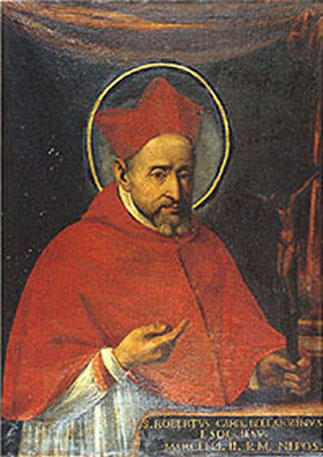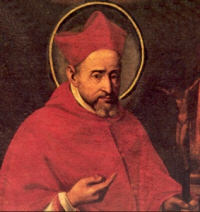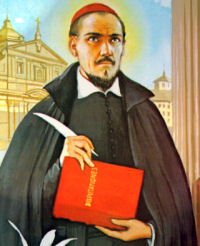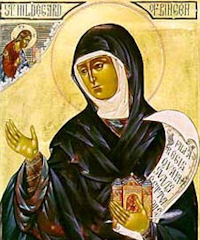36. And one of the Pharisees desired him that he would eat with him. And he went into the Pharisee's house, and sat down to meat.
37. And, behold, a woman in the city, which was a sinner, when she knew that Jesus sat at meat in the Pharisee's house, brought an alabaster box of ointment,
38. And stood at his feet behind him weeping, and began to wash his feet with tears, and did wipe them with the hairs of her head, and kissed his feet, and anointed them with the ointment.
39. Now when the Pharisee which had bidden him saw it, he spoke within himself, saying, This man, if he were a prophet, would have known who and what manner of woman this is that touches him: for she is a sinner.
40. And Jesus answering said to him, Simon, I have somewhat to say to you. And he said, Master, say on.
41. There was a certain creditor which had two debtors: the one owed five hundred pence, and the other fifty.
42. And when they had nothing to pay, he frankly forgave them both. Tell me therefore, which of them will love him most?
43. Simon answered and said, I suppose that he, to whom he forgave most. And he said to him, you have rightly judged.
44. And he turned to the woman, and said to Simon, See you this woman? I entered into your house, you gave me no water for my feet: but she has washed my feet with tears, and wiped them with the hairs of her head.
45. You gave me no kiss: but this woman since the time I came in has not ceased to kiss my feet.
46. My head with oil you did not anoint: but this woman has anointed my feet with ointment.
47. Wherefore I say to you, Her sins, which are many, are forgiven; for she loved much: but to whom little is forgiven, the same loves little.
48. And he said to her, Your sins are forgiven.
49. And they that sat at meat with him began to say within themselves, Who is this that forgives sins also?
50. And he said to the woman, Your faith has saved you: go in peace.
THEOPHYL; Having said just before, And the people that heard him justified God, being baptized with the baptism of John the same Evangelist builds up in deed what he had proposed in word, namely, wisdom justified by the righteous and the penitent, saying, And one of the Pharisees desired him, &c.
GREG. NYSS. This account is full of precious instruction. For there are very many who justify themselves, being puffed up with the dreamings of an idle fancy, who before the time of Judgment comes, separate themselves as lambs from the herds, not willing even to join in eating with the many, and hardly with those who go not to extremes, but keep the middle path in life. St. Luke, the physician of souls rather than of bodies, represents therefore our Lord and Savior most mercifully visiting others, as it follows, And he went into the Pharisees' house, and sat down to meat. Not that He should share any of his faults, but might impart somewhat of His own righteousness.
CYRIL; A woman of corrupt life, but testifying her faithful affection, comes to Christ, as having power to release her from every fault, and to grant her pardon for the crimes she had committed. For it follows, And behold a woman in the city which was a sinner brought an alabaster box of ointment.
THEOPHYL; Alabaster is a kind of white marble tinged with various colors, which is generally used for vessels holding ointment, because it is said to be the best sort for preserving the ointment sweet.
GREG. For this woman, beholding the spots of her shame, ran to wash them at the fountain of mercy, and blushed not at seeing the guests, for since she was courageously ashamed of herself within, she thought there was nothing which could shame her from without. Observe with what sorrow she is wrung who is not ashamed to weep even in the midst of a feast!
GREG. NYSS. But to mark her own unworthiness, she stands behind with downcast eyes, and with her hair thrown about embraces His feet, and washing them with her tears, betokened a mind distressed at her state, and imploring pardon. For it follows, And standing behind, she began to wash his feet with her tears.
GREG. For her eyes which once coveted after earthly things, she was now wearing out with penitential weeping. She once displayed her hair for the setting off of her face, she now wiped her tears with her hair. As it follows, And she wiped them with the hairs of her head. She once uttered proud things with her mouth, but kissing the feet of the Lord, she impressed her lips on the footsteps of her Redeemer. She once used ointment for the perfume of her body; what she had unworthily applied to herself, she now laudably offered to God. As it follows, And she anointed with ointment. As many enjoyments as she had in herself, so many offerings did she devise out of herself. She converts the number of her faults into the same number of virtues, that as much of her might wholly serve God in her penitence, as had despised God in her sin.
CHRYS. Thus the harlot became then more honorable than the virgins. For no sooner was she inflamed with penitence, than she burst forth in love for Christ. And these things indeed which have been spoken of were done outwardly, but those which her mind pondered within itself, were much more fervent. God alone beheld them.
GREG. But the Pharisee beholding these things despises them, and finds fault, not only with the woman who was a sinner, but with the Lord who received her, as it follows, Now when the Pharisee who had bidden him saw it, he spoke within himself, saying, This man, if he were a prophet, would have known who and what manner of woman this is which touches him. We see the Pharisee really proud in himself, and hypocritically righteous, blaming the sick woman for her sickness, the physician for his aid. The woman surely if she had come to the feet of the Pharisee would have departed with the heel lifted up against her. For he would have thought that he was polluted by another's sin, not having sufficient of his own real righteousness to fill him. So also some gifted with the priests' office, if perchance they have done any just thing outwardly or slightly, forthwith despise those who are put under them, and look with disdain on sinners who are of the people. But when we behold sinners, we must first bewail ourselves for their calamity, since we perhaps have had and are certainly liable to a similar fall. But it is necessary that we should carefully distinguish, for we are bound to make distinction in vices, but to have compassion on nature. For if we must punish the sinner, we must cherish a brother. But when by penance he has himself punished his own deed, our brother is no more a sinner, for he punished in himself what Divine justice condemned. The Physician was between two sick persons, but the one preserved her faculties in the fever, the other lost his mental perception. For she wept at what she had done; but the Pharisee, elated with a false sense of righteousness, overrated the vigor of his own health.
TIT. BOST. But the Lord not hearing his words, but perceiving his thoughts, showed Himself to be the Lord of Prophets, as it follows, And Jesus answering said to him, Simon, I have something to say to you.
GLOSS. And this indeed He spoke in answer to his thoughts; and the Pharisee was made more attentive by these words of our Lord, as it is said, And he said, Master, say on.
GREG. A parable concerning two debtors is opposed to him, of whom the one owed more, the other less; as it follows, There was a certain creditor which had two debtors , &c.
TIT. BOST. As if He said, Nor are you without debts. What then! If you are involved in fewer debts, boast not thyself, for you art still in need of pardon. Then He goes on to speak of pardon, And when they had nothing to pay, he freely forgave them both.
GLOSS. For no one can of himself escape the debt of sin, but only by obtaining pardon through the grace of God.
GREG. But both debtors being forgiven, the Pharisee is asked which most loved the forgiver of the debts. For it follows, Who then will love him most? To which he at once answers, I suppose, that be to whom he forgave most. And here we must remark, that while the Pharisee is convicted upon his own grounds, the madman carries the rope by which he will be bound; as it follows, But he said to him, you have rightly judged.
The good deeds of the sinful woman are enumerated to him, and the evils of the pretended righteous; as it follows, And he turned to the woman, and said to Simon, See you this woman? I entered into your house, you gave me no water for my feet, but she has washed my feet with her tears.
TIT. BOST. As if He said, To provide water is easy, to pour forth tears is not easy. You have not provided even what was at hand, she has poured forth what was not at hand; for washing my feet with her tears, she washed away her own stains.
She wiped them with her hair, that so she might draw to herself the sacred moisture, and by that by which she once enticed youth to sin, might now attract to herself holiness.
CHRYS. But as after the breaking of a violent storm there comes a calm,, so when tears have burst forth, there is peace, and gloomy thoughts vanish; and as by water and the Spirit, so by tears and confession we are again made clean. Hence it follows, Wherefore I say to you, Her sins which are many are forgiven, for she loves much. For those who have violently plunged into evil, will in time also eagerly follow after good, being conscious to what debts they have made themselves responsible.
GREG. The more then the heart of the sinner is burnt up by the great fire of charity, so much the more is the rust of sin consumed. TIT. BOST. But it more frequently happens that he who has sinned much is purified by confession, but he who has sinned little, refuses from pride to come to be healed thereby. Hence it follows, But to whom little is forgiven, the same loves little.
CHRYS. We have need then of a fervent spirit, for nothing hinders a man from becoming great. Let then no sinner despair, no virtuous man fall asleep; neither let the one be self-confident, for often the harlot shall go before him, nor the other distrustful, for he may even surpass the foremost. Hence it is also here added, But he said to her, Your sins are forgiven you.
GREG. Behold she who had come sick to the Physician was healed, but because of her safety others are still sick; for it follows, And they that sat at meat began to say within themselves, Who is this that forgives sins also. But the heavenly Physician regards not those sick, whom He sees to be made still worse by His remedy, but her whom He had healed He encourages by making mention of her own piety; as it follows, But he said to the woman, Your faith has made you whole; for in truth she doubted not that she would receive what she sought for.
THEOPHYL. But after having forgiven her sins, He stops not at the forgiveness of sins, but adds good works, as it follows, Go in peace, i.e. in righteousness, for righteousness is the reconciliation of man to God, as sin is the enmity between God and man; as if He said, Do all things which lead you to the peace of God.
AMBROSE; Now in this place many seem to be perplexed with the question, whether the Evangelists do not appear to have differed concerning the faith.
GREEK EX. For since the four Evangelists relate that Christ was anointed with ointment by a woman, I think that there were three women, differing according to the quality of each, their mode of action, and the difference of times. John, for example, relates that Mary, the sister of Lazarus, six days before the Passover, anointed the feet of Jesus in her own house; but Matthew, after that the Lord had said, You know that after two days will be the Passover, adds, that in Bethany, at the house of Simon the leper, a woman poured ointment upon the head of our Lord, but did not anoint His feet as Mary. Mark also says the same as Matthew; but Luke gives the account not near the time of the Passover, but in the middle of the Gospel. Chrysostom explains it that there were two different women, one indeed who is described in John, another who is mentioned by the three.
AMBROSE; Matthew has introduced this woman as pouring ointment upon the head of Christ, and was therefore unwilling to call her a sinner, for the sinner, according to Luke, poured ointment upon the feet of Christ. She cannot then be the same, lest the Evangelists should seem to be at variance with one another. The difficulty may be also solved by the difference of merit and of time, so that the former woman may have been yet a sinner, the latter now more perfect.
AUG. For I think we must understand that the same Mary did this twice, once indeed as Luke has related, when at first coming with humility and weeping, she was thought worthy to receive forgiveness of sins. Hence John, when he began to speak of the resurrection of Lazarus, before he came to Bethany, says, But it was Mary who anointed our Lord with ointment, and wiped his feet with her hair, whose brother Lazarus was sick. Mary therefore had already done this; but what she again did in Bethany is another occurrence, which belongs not to the relation of Luke, but is equally told by the other three.
GREG. Now in a mystical sense the Pharisee, presuming upon his pretended righteousness, is the Jewish people; the woman who was a sinner, but who came and wept at our Lord's feet, represents the conversion of the Gentiles.
AMBROSE; Or, the leper, is the prince of this world; the house of Simon the leper, is the earth. The Lord therefore descended from the higher parts to this earth; for this woman could not have been healed, who bears the figure of a soul or the Church, had not Christ come upon earth. But rightly does she receive the figure of a sinner, for Christ also took the form of a sinner. If then you make your soul approach in faith to God, it not with foul and shameful sins, but piously obeying the word of God, and in the confidence of unspotted purity, ascends to the very head of Christ. But the head of Christ is God. But let him who holds not the head of Christ, hold the feet, the sinner at the feet, the just at the head; nevertheless she also who sinned, has ointment.
GREG. What else is expressed by the ointment, but the sweet savor of a good report? If then we do good works by which we may sprinkle the Church with the sweet odor of a good report, what else do we but pour ointment upon the body of our Lord. But the woman stood by His feet, for we stood over against the feet of the Lord, when yet in our sins we resisted His ways. But if we are converted from our sins to true repentance, we now again stand by His feet, for we follow His footsteps whom we before opposed.
AMBROSE; Bring you also repentance after sin. Wherever you hear the name of Christ, speed thither; into whatever house you know that Jesus has entered, thither hasten; when you find wisdom, when you find justice sitting in any inner chamber, run to its feet, that is, seek even the lowest part of wisdom; confess your sins with tears. Perhaps Christ washed not His own feet, that we might wash them with our tears. Blessed tears, which can not only wash away our own sin, but also water the footsteps of the heavenly Word, that His goings may abound in us. Blessed tears, in which there is not only the redemption of sinners, but the refreshing of the righteous.
GREG. For we water the feet of our Lord with tears if we are moved with compassion to any even the lowest members of our Lord. We wipe our Lord's feet with our hair, when we show pity to His saints (with whom we suffer in love) by the sacrifice of those things with which we abound.
AMBROSE; Throw about your hair, scatter before Him all the graces of your body. The hair is not to be despised which can wash the feet of Christ.
GREG. The woman kisses the feet which she has wiped. This also we fully do when we ardently love those whom we maintain by our bounty. By the feet also may be understood tile mystery itself of the Incarnation. We then kiss the feet of the Redeemer when we love with our whole heart the mystery of the Incarnation. We anoint the feet with ointment, when we proclaim the power of His humanity with the good tidings of holy eloquence. But this also the Pharisee sees and grudges, for when the Jewish people perceives that the Gentiles preach God, it consumes away by its own malice. But the Pharisee is thus repulsed, that as it were through Him that false people might be made manifest, for in truth that unbelieving people never offered to the Lord even those things which were without them; but the Gentiles being converted, poured forth not only their substance but their blood. Hence He says to the Pharisee, You gave me no water for my feet, but she has washed my feet with her tears; for water is without us, the moisture of tears is within us. That unfaithful people also gave no kiss to the Lord, for it was unwilling to embrace Him from love whom it obeyed from fear, (for the kiss is the sign of love,) but the Gentiles being called cease not to kiss the feet of their Redeemer, for they ever breathe in His love.
AMBROSE; But she is of no slight merit of whom it is said, From the time that she entered has not ceased to kiss my feet, so that sue knew not to speak aught but wisdom, to love aught but Justice, to touch aught but chastity, to kiss aught but modesty.
GREG. But it is said to the Pharisee, My head with oil you did not anoint, for the very power even of Divinity on which the Jewish people professed to believe, he neglects to celebrate with due praise. But she has anointed my feet with ointment. For while the Gentile people believed the mystery of His incarnation, it proclaimed also His lowest powers with the highest praise.
AMBROSE; Blessed is he even who can anoint with oil the feet of Christ, but more blessed is he who anoints with ointment, for the essence of many flowers blended into one, scatters the sweets of various odors. And perhaps no other than the Church alone can bring that ointment which has innumerable flowers of different perfumes, and therefore no one can love so much as she who loves in many individuals. But in the Pharisee's house, that is, in the house of the Law and the Prophets, not the Pharisee, but the Church is justified. For the Pharisee believed not, the Church believed. The Law has no mystery by which secret faults are cleansed, and therefore that which is wanting in the Law is made up in the Gospel.
But the two debtors are the two nations who are responsible for payment to the usurer of the heavenly treasury. But we do not owe to this usurer material money, but the balance of our good deeds, the coin of our virtues, the merits of which are estimated by the weight of sorrow, the stamp of righteousness, the sound of confession. But that denarius is of no slight value on which the image of the king is found. Woe to me if I shall not have what I received. Or because there is hardly any one who can pay the whole debt to the usurer, woe to me if I shall not seek the debt to be forgiven me.
But what nation is it that owes most, if not we to whom most is lent? To them were entrusted the oracles of God, to us is entrusted the Virgin's offspring, Immanuel, i. e. God with us, the cross of our Lord, His death, His resurrection. It cannot then be doubted that he owes most who receives most. Among men he perhaps offends most who is most in debt. By the mercy of the Lord the case is reversed, so that he loves most who owes most, if so be that he obtains grace. And therefore since there is nothing which we can worthily return to the Lord, woe be to me also if I shall not have loved. Let us then offer our love for the debt, for he loves most to whom most is given.
Catena Aurea Luke 7
 Also known as
Also known as



 He was born at Montepulciano in Tuscany on October 4, 1542, the feast of the Poverello of Assisi toward whom he always cherished a special devotion. The day on which he died, September 17, is now the feast in honor of the stigmata of St. Francis.
He was born at Montepulciano in Tuscany on October 4, 1542, the feast of the Poverello of Assisi toward whom he always cherished a special devotion. The day on which he died, September 17, is now the feast in honor of the stigmata of St. Francis.  Saint Bonaventure, biographer of Saint Francis of Assisi, wrote that two years before his holy death he had been praying on Mount Alverno in a solitary retreat, where he had gone to fast for forty days in honor of the Archangel Michael. No one ever meditated more than Francis on the Passion of his Lord. During his retreat he beheld in vision a six-winged Seraph attached to a cross, and received at the same time a painful wound of the heart, which seemed to transpierce it. When the vision ended his own hands and feet bore the marks of the angelic crucifixion which he had seen in the vision. He understood by his vision that the soul must come to resemble Christ by the ardors of its interior fire, rather than by any physical, exterior means. We reproduce here a meditation of the saintly 19th century Abbot, Dom Guéranger of Solemnes in France
Saint Bonaventure, biographer of Saint Francis of Assisi, wrote that two years before his holy death he had been praying on Mount Alverno in a solitary retreat, where he had gone to fast for forty days in honor of the Archangel Michael. No one ever meditated more than Francis on the Passion of his Lord. During his retreat he beheld in vision a six-winged Seraph attached to a cross, and received at the same time a painful wound of the heart, which seemed to transpierce it. When the vision ended his own hands and feet bore the marks of the angelic crucifixion which he had seen in the vision. He understood by his vision that the soul must come to resemble Christ by the ardors of its interior fire, rather than by any physical, exterior means. We reproduce here a meditation of the saintly 19th century Abbot, Dom Guéranger of Solemnes in France Called the "Sibyl of the Rhine," Hildegard of Bingen became the most famous mystic and prophet of her time. Her writings and music are still found in all major bookstores, and no woman saint is more popular in her native Germany. When she was eight, she was placed in a convent, where she later became abbess. She was a biblical exegete, visionary, preacher, composer, and herbalist, who corresponded with the major royalty and church leaders of her day, including four popes. Her greatest vision came when she was forty-two, which is recorded in her famous Scrivias, or Know the Ways of the Lord, a treatise whose magnificence rivals William Blake's visionary work. Hildegard's spiritual writings found approval during her lifetime, and her lectures on the spiritual life drew crowds from all over Europe. She wrote prolifically, on topics as varied as history and drama, polictics and and liturgical poetry. Her monastery joyfully sang the praises she wrote. During the last year of her life, when she was eighty-one, she entered into a conflict with ecclesiastical authorities because she allowed a young man who had been excommunicated to be buried in her abbey cemetery, and her convent was placed under interdict. It is probably that, for this reason, Hildegard was never formally canonized, although she is found in all major saints' books and her cult was approved locally because of so many miracles reported at her tomb.
Called the "Sibyl of the Rhine," Hildegard of Bingen became the most famous mystic and prophet of her time. Her writings and music are still found in all major bookstores, and no woman saint is more popular in her native Germany. When she was eight, she was placed in a convent, where she later became abbess. She was a biblical exegete, visionary, preacher, composer, and herbalist, who corresponded with the major royalty and church leaders of her day, including four popes. Her greatest vision came when she was forty-two, which is recorded in her famous Scrivias, or Know the Ways of the Lord, a treatise whose magnificence rivals William Blake's visionary work. Hildegard's spiritual writings found approval during her lifetime, and her lectures on the spiritual life drew crowds from all over Europe. She wrote prolifically, on topics as varied as history and drama, polictics and and liturgical poetry. Her monastery joyfully sang the praises she wrote. During the last year of her life, when she was eighty-one, she entered into a conflict with ecclesiastical authorities because she allowed a young man who had been excommunicated to be buried in her abbey cemetery, and her convent was placed under interdict. It is probably that, for this reason, Hildegard was never formally canonized, although she is found in all major saints' books and her cult was approved locally because of so many miracles reported at her tomb. 
